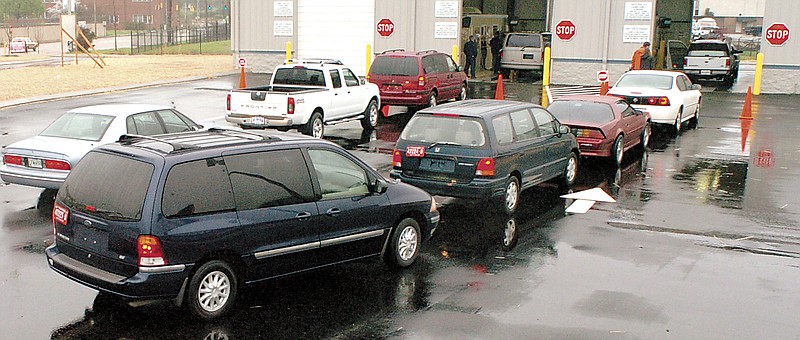NASHVILLE - A bill that would end vehicle emissions testing in Hamilton and five other Tennessee counties easily cleared its first legislative hurdle Wednesday.
Sen. Bo Watson, R-Hixson, told Senate Transportation Committee members the program is no longer needed because all six counties are now in compliance with federal Environmental Protection Agency requirements for clean air.
"It is my argument today ... that it is time for us to repeal the emissions testing and replace it with another strategy that puts less financial stress on those who can least afford it," said Watson, adding those with the fewest financial resources are most often the ones whose vehicles fail the test, resulting in costly repairs.
The senator said that, while no one wants dirty air, "this strategy has done its job. It's done exactly what it was intended to do."
Watson's bill, sponsored by Rep. Mike Carter, R-Ooltewah, in the House, has drawn concerns from Tennessee Department of Environment and Conservation Commissioner Bob Martineau as well as Bob Colby, director of the Chattanooga-Hamilton County Air Pollution Control Bureau.
Both officials have noted that although Hamilton, Davidson, Sumner, Rutherford, Williams and Wilson counties are in attainment now, areas must maintain current standards and can't backslide. All have what are known as inspection and maintenance programs under a state implementation plan approved by the EPA and federally enforceable.
The counties would have to come up with emissions reductions in other areas equal to credits EPA gave them back in 2005 for implementing emissions testing, officials have said.
Watson acknowledged there would be requirements to make up the emissions elsewhere, but he pointed out that Shelby and Knox counties didn't have to implement emissions testing programs through other methods.
Martineau said in an interview earlier this year that Shelby was able to do away with its program when a major manufacturing plant shut down.
Sen. Jeff Yarbro, D-Nashville, said although there are aspects of Watson's argument he understands and is sympathetic to, he worries that repealing emissions testing without specifying in statute options to take its place is problematic.
He also questioned why the bill wouldn't be permissive as opposed to mandatory.
Replied Watson: "Every journey begins with a first step. In order to bring TDEC and others to the table in conversation you got to bring something that moves the conversation."
Watson said it would be "an additional conversation" on what options would be allowed, and perhaps Davidson County could continue the testing.
According to a legislative fiscal analysis, prohibiting state and local government entities from conducting vehicle inspections "will necessitate changes to the state implementation plan under the federal Clean Air Act."
If EPA refuses to go along, the analysis says, "the state will be out of compliance with federal requirements and could be subject to sanctions" under the act.
The fiscal note also says the bill, should it become law, would decrease state revenue by $1.7 million annually a year beginning in fiscal year 2020.
Local governments would lose $927,200 annually with that rising to $3 million in fiscal year 2023 and subsequent years. Hamilton and four of the counties are on a statewide inspection vendor contract that ends in 2019, while Davidson County has its own that ends in 2022.
Watson said that it also shows that of the $9 testing fee paid in Hamilton County, $2.80 goes to the state with $1 of that going to local county clerks for processing.
That means emissions-testing companies are getting about $6.20.
The bill now goes to the Senate Finance Committee of which Watson is chairman.
Contact Andy Sher at asher@timesfreepress.com or 615-255-0550. Follow him on Twitter @AndySher1.


